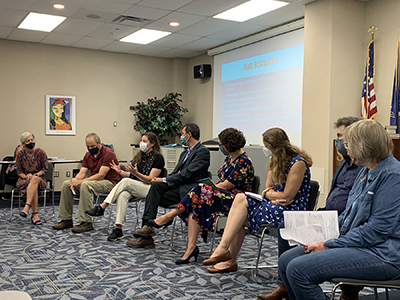JEDI Areas of Focus
 The JEDI Institute aims to cover the following five areas of focus as we work together to make our college more just, equitable, diverse, and inclusive. In the photo at right, JEDI executive board member Jill Santiago, left, facilitates a panel discussion during our summer pilot program.
The JEDI Institute aims to cover the following five areas of focus as we work together to make our college more just, equitable, diverse, and inclusive. In the photo at right, JEDI executive board member Jill Santiago, left, facilitates a panel discussion during our summer pilot program.
- Examination of assumptions — Participants will have the opportunity to reflect on their own assumptions and implicit biases as we all work in education and to consider the assumptions that students may be making about us too. In addition, work will be done to help participants move from bemoaning the lack of the “ideal” student toward understanding and embracing the students we actually have in front of us—and to be committed to helping students navigate from wherever they are and to where they want and need to be.
- More inclusive course outlines and course content — Classroom faculty will have access to resources for and discussions about how to revise their course outlines to be more inclusive. This might include information and advice on more equitable grading approaches (e.g., Asao Inoue’s labor-based grading); identifying SCCC and local student support services; integrating the SCCC diversity statement, student handbook statements; and more. They'll also have access to resources for and discussions about how their course content might be revised and improved to be more JEDI.
- More inclusive nonclassroom student interactions — Nonclassroom employees (and classroom faculty who are in other settings, such as club advisor) will have access to resources for and discussions about how to revise their daily practices to be more inclusive. This might include becoming more knowledgeable about our students' backgrounds, managing confidential conversations, trauma-informed interactions, and more.
- Antiracist pedagogy and work principles — The core of this JEDI institute will center on antiracist pedagogy and work principles, giving participants the opportunity to foreground issues of race and racism in their pedagogical and daily work practices. Topics will include but not be limited to embedding learning how to learn into your interactions with students, connecting the known to the unknown (valuing students’ current knowledge), teaching about growth mindset, understanding stereotype threat, integrating student writing/reflection time, etc.
- Managing difficult dialogues — Learning how to manage what the Derek Bok Center at Harvard refers to as “hot moments” during class conversations—whether they come during on-campus or remote interactions—is critical. Participants will have opportunities to explore how pointing to their discipline’s scholarship as well as institutional expectations (SCCC and SUNY) can help navigate this. Participants will review case studies, practice appropriate responses and learn about faculty and student rights and responsibilities when it comes to recording class or other conversations.








